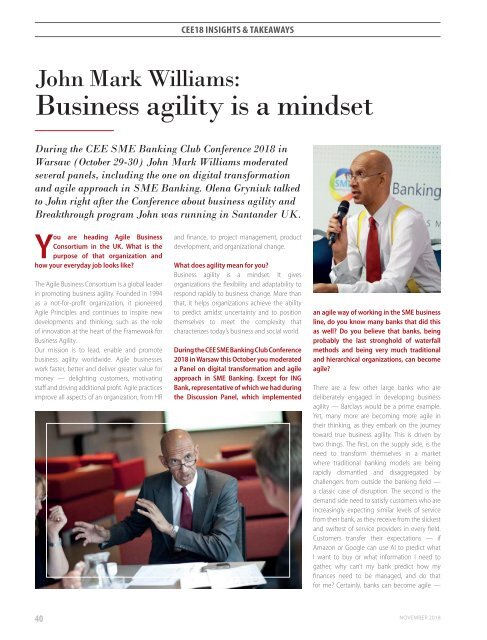SBM magazine / 11-2018
business / banking / SME Banking Club
business / banking / SME Banking Club
You also want an ePaper? Increase the reach of your titles
YUMPU automatically turns print PDFs into web optimized ePapers that Google loves.
CEE18 INSIGHTS & TAKEAWAYS<br />
John Mark Williams:<br />
Business agility is a mindset<br />
During the CEE SME Banking Club Conference <strong>2018</strong> in<br />
Warsaw (October 29-30) John Mark Williams moderated<br />
several panels, including the one on digital transformation<br />
and agile approach in SME Banking. Olena Gryniuk talked<br />
to John right after the Conference about business agility and<br />
Breakthrough program John was running in Santander UK.<br />
You are heading Agile Business<br />
Consortium in the UK. What is the<br />
purpose of that organization and<br />
how your everyday job looks like?<br />
The Agile Business Consortium is a global leader<br />
in promoting business agility. Founded in 1994<br />
as a not-for-profit organization, it pioneered<br />
Agile Principles and continues to inspire new<br />
developments and thinking, such as the role<br />
of innovation at the heart of the Framework for<br />
Business Agility.<br />
Our mission is to lead, enable and promote<br />
business agility worldwide. Agile businesses<br />
work faster, better and deliver greater value for<br />
money — delighting customers, motivating<br />
staff and driving additional profit. Agile practices<br />
improve all aspects of an organization, from HR<br />
and finance, to project management, product<br />
development, and organizational change.<br />
What does agility mean for you?<br />
Business agility is a mindset. It gives<br />
organizations the flexibility and adaptability to<br />
respond rapidly to business change. More than<br />
that, it helps organizations achieve the ability<br />
to predict amidst uncertainty and to position<br />
themselves to meet the complexity that<br />
characterizes today’s business and social world.<br />
During the CEE SME Banking Club Conference<br />
<strong>2018</strong> in Warsaw this October you moderated<br />
a Panel on digital transformation and agile<br />
approach in SME Banking. Except for ING<br />
Bank, representative of which we had during<br />
the Discussion Panel, which implemented<br />
an agile way of working in the SME business<br />
line, do you know many banks that did this<br />
as well? Do you believe that banks, being<br />
probably the last stronghold of waterfall<br />
methods and being very much traditional<br />
and hierarchical organizations, can become<br />
agile?<br />
There are a few other large banks who are<br />
deliberately engaged in developing business<br />
agility — Barclays would be a prime example.<br />
Yet, many more are becoming more agile in<br />
their thinking, as they embark on the journey<br />
toward true business agility. This is driven by<br />
two things. The first, on the supply side, is the<br />
need to transform themselves in a market<br />
where traditional banking models are being<br />
rapidly dismantled and disaggregated by<br />
challengers from outside the banking field —<br />
a classic case of disruption. The second is the<br />
demand side need to satisfy customers who are<br />
increasingly expecting similar levels of service<br />
from their bank, as they receive from the slickest<br />
and swiftest of service providers in every field.<br />
Customers transfer their expectations — if<br />
Amazon or Google can use AI to predict what<br />
I want to buy or what information I need to<br />
gather, why can’t my bank predict how my<br />
finances need to be managed, and do that<br />
for me? Certainly, banks can become agile —<br />
40<br />
NOVEMBER <strong>2018</strong>

















